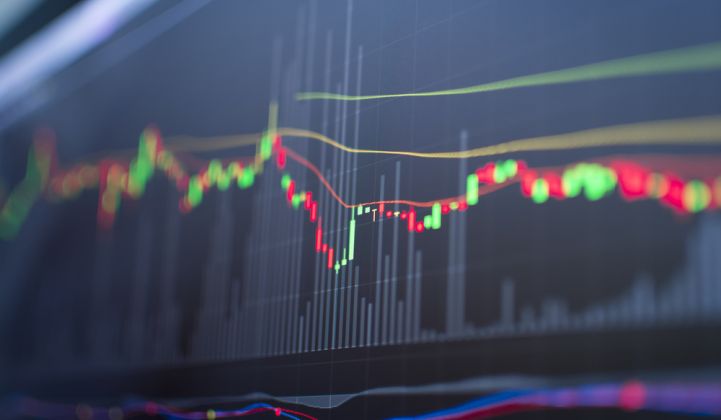So far, 2016 hasn’t been too kind to SolarCity’s stock.
The leading rooftop solar installer’s share price is down more than 60 percent since the start of the year, after more than doubling at the end of 2015.
This week, JPMorgan downgraded SolarCity’s stock to neutral and lowered the company’s target price from $44 to $29, which still puts the target 53 percent higher than SolarCity’s closing price on Wednesday.
“We still believe the stock is undervalued; however, risk is currently elevated and business model uncertainty will weigh on the stock in 2016,” JPMorgan analyst Paul Coster wrote in an investor note.
SolarCity’s stock price has been on a roller coaster for the past 12 months, which reflects the company’s complex and evolving business model in the face of market and policy shifts.
Coster noted that over the past year SolarCity launched and withdrew a loan product and changed some of its accounting metrics. These changes make sense to analysts, but add complexity to the company's story and make it harder to attract new money to the stock.
SolarCity also lowered its 2016 installation guidance last fall, citing concerns over the expiration of the federal Investment Tax Credit (which was ultimately extended) and the need to reduce costs to become cash-flow positive. The installer’s 2016 guidance of 1.25 gigawatts represents 40 percent growth year over year, “which aligns with the overall residential solar market growth but implies for SCTY a re-accelerating and a back-end loaded year -- a risk,” according to Coster.
In addition, investors were disappointed with SolarCity’s fourth-quarter performance, which was 6 percent below expectations.
Barclays also downgraded SolarCity’s stock this month, lowering the price target from $49.00 to $20.00. Analyst Jon Windham noted that SolarCity’s first-quarter guidance of 180 megawatts is lower than estimates, and does not track with 40 percent projected year-over-year growth.
On February 12, chairman Elon Musk purchased 569,680 shares of SolarCity stock for just over $10 million, according to a SEC filing. Musk purchased the shares for $17.56 each, one of the company’s lowest trading prices in three years, which could prove to be a wise strategic move if the stock rebounds.
SolarCity’s stock ticked up with the news of Musk’s acquisition, but has since slumped and currently sits at $18.90 per share.
Going forward, there are some big headwinds facing SolarCity. Nevada’s recent decision to cut net-metering credits retroactively sends a worrying signal to investors, according to JPMorgan’s Coster. However, California’s solar policy provides some encouragement.
Coster also wrote that SolarCity’s success in reaching lower-income customers creates some concern. New customers at the lower end of the income spectrum “may be at some risk of slow-pay or default in the event of an economic downturn, at least relative to the high-income and high-net-worth individuals that many investors assumed to be SolarCity’s target market.”
The possibility that buying solar could become as commonplace as purchasing a boiler or air conditioner is another concern. “As the cost of solar declines in the United States, as awareness increases, and as financing and leasing options proliferate, it is conceivable that the national/regional solar leasing brands lose share of the solar market to local installers and contractor,” Coster wrote.
Separately, Barclay's Windham noted that the Supreme Court stay on the Clean Power Plan, while not directly related to distributed solar, is likely to chill investment across the alternative energy sector.
But while there are risks in the rooftop solar industry, Coster reiterated that SolarCity’s stock is undervalued, in his view. He also underscored that JPMorgan’s downgrade is not a call to short the stock or sell existing SolarCity positions. Plus, there are potential positive drivers ahead, "foremost being financing transactions that demonstrate that the firm can tap incrementally lower-cost capital.”



